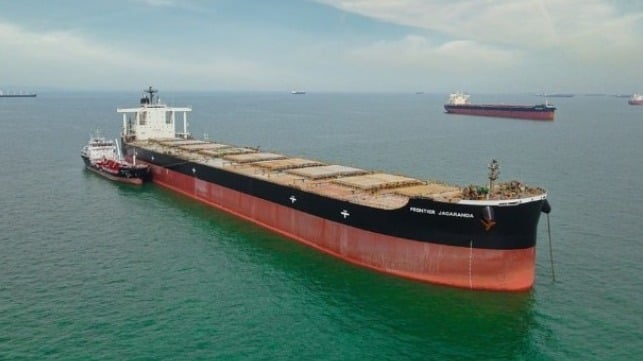More Shipping Companies Testing Biofuel in Operations

A growing number of shipping companies in different parts of the industry are continuing to experiment with the use of biofuels as a near-term means of improving the environmental performance of their operations. Made from reused oil, biofuel also provides the benefit of recycling an otherwise waste product.
Among the companies reporting recent tests of the alternative fuel product were two of Japan’s largest shipping companies, Mitsui O.S.K. Lines (MOL) and NYK. Anglo American as charterer of the NYK vessel also demonstrated the involvement of other parts of the supply chain. In the U.K., both crewing vessels serving an offshore wind field and tugs on the Thames also joined the broader effort to test biofuels. The companies are exploring different forms of the sustainable product.
MOL working through its subsidiary Euro Marine Logistics headquartered in Belgium started sea trials in June for one of its car carriers. The 11-year-old vessel City of Oslo (5,432 dwt) loaded approximately 370 tons of biofuel from supplier GoodFuels while at the Dutch port of Flushing. MOL highlighted the benefits that the fuel can be used on vessels without changing the engine specifications. The test is ongoing for the car carrier.
At the same time in the Far East, NYK working in conjunction with mining company Anglo American, which was the charterer of their vessel, conducted a biodiesel test. The 10-year-old capsize bulker Frontier Jacaranda (182,757 dwt) loaded biodiesel in Singapore before a voyage to the Saldanha Bay in South Africa. In this instance, Toyota Tsusho Petroleum supplied a biodiesel blend consisting of seven percent biofuel and 93 percent standard marine diesel.
According to Anglo American, the mix reduces CO2 emissions by around five percent. Among the elements they were exploring was the stability of the biofuel in storage and its performance as a fuel. Data gathered was expected to provide new insights into wider efforts to introduce biofuel to the maritime sector. They were also exploring ways of improving the cost-effectiveness and they plan to use higher percentage blends in future trials.
It was the second large-scale trial that NYK has conducted with one of its vessels. In January 2019, the NYK dry bulk carrier Frontier Sky loaded biofuel in Europe. In that trial, the vessel operating for mining company BHP used biofuel made from waste oils such as used cooking oil loaded in Rotterdam in conjunction with GoodFuels. NYK also reported that it used blockchain technology to enhance the traceability of the fuel to establish a clear chain of custody for better quality assurance in the bunker fuel supply chain.
Possibly in a first for the offshore sector, ScottishPower Renewables also launched a pilot project using waste vegetable oil to help power crew transfer vessels working on its East Anglia ONE offshore wind farm, located approximately 25 miles off the southeast coast of England. The renewable fuel, HVO30, is a marine gas oil blend made with 30 percent hydrogenated vegetable oil. It is being used to power two crew transfer vessels provided by Great Yarmouth-based NR Marine Services. Compared to standard marine gas oil, HVO30 is predicted to result in around a 30 percent reduction in equivalent CO2 emissions from the two vessels.
The use of biofuels has also spread to tugboats moving waste barges on the River Thames in London. Cory Group, which transports a million tons of waste in barges on the river annually to its recycling and waste from energy facility, recently completed a test of biofuel made from cooking oil and waste fats. The company is now converting its fleet of tugs to biofuel.

that matters most
Get the latest maritime news delivered to your inbox daily.
Other shipping companies have done tests with variations of the biofuel both in Europe and recently the first test from Singapore involving Oldendorff and BHP. In 2020, ONE tested biofuel on one of its containerships while MSC and CMA CGM worked with biofuel on their vessels. Eastern Pacific presented the results of its test at an IMO-sponsored symposium, and Stena Bulk introduced the fuel and a carbon offset program for customers purchasing biofuels after conducting a series of tests on its vessels.
While biofuel does not provide a comprehensive solution to the reduction of GHG emissions, it provides a near-term alternative for shipping companies seeking to make incremental improvements from their operations while other options in carbon capture and alternative fuels continue under development.
